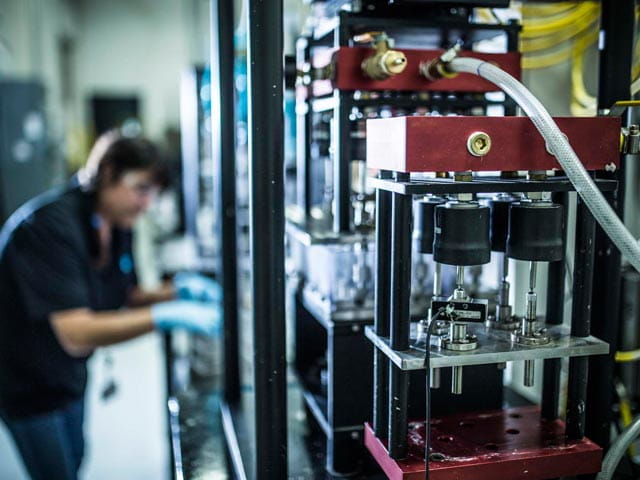Abrasion Testing Explained

By Engaged Expert
Ryan CastellsRyan Castells is a highly experienced specialist in the material behavior of both PMC and CMC materials within the Aerospace sector.
Element specializes in a variety of abrasion test methods, including both standard and custom abrasion testing. Which test method you use is dependent upon the application and goals of your individual project.
In this article, we outline additional information about each test method to assist in your specific evaluation.
Taber Abrasion Testing
Taber Abrasion is a quick and inexpensive procedure, designed to compare the wear rate and mass-loss of one or more material or coatings. A typical Taber abrasion test consists of a disk-shaped specimen that is placed in constant contact with an abrasive wheel, using predetermined forces to a specified number of cycles to determine wear. The most commonly used standards for these tests are: ASTM D4060, ASTM F1978-12 and MIL-A-8625. Element frequently recommends Taber abrasion as a quick and simple way to measure wear resistance and offer sufficient comparable data at a reasonable price. It gives a side by side comparison of several materials or coatings, so you can evaluate which material has better wear resistance under simulated, accelerated wear conditions.
Pin-on-Disk Wear Testing
Pin-on-Disk wear testing involves abrading two materials – one material is machined into a pin, the other into a disk – to determine a variety of wear properties. This test is beneficial if you want to compare tribological properties of a pair of materials. These properties include frictional force coefficients and wear rates of your specific material pair. Pin-on-Disk wear testing is widely used when trying to select an appropriate material couple for medical, manufacturing, or other applications. Pin-on-Disk can also be conducted at elevated temperatures or in submerged environments to more accurately simulate “real life” wear conditions. Typical specifications include ASTM G99 and ASTM G132.
Blade-on-Block Wear Testing
Blade-on-Block abrasion testing typically utilizes an object (block) that articulates back and forth on a stationary specimen (blade) while being subjected to a constant normal load. Some examples of behavior that are characterized by this test are lifespan of coatings and coefficient of friction. Blade-on-Block testing is especially useful when a specimen needs nonstandard environmental conditions or a higher load force than Pin-on-Disk testing can achieve.
RCA Abrasion Testing
Inks and coatings on printed membrane switches are affected by repeated abrasive forces, most commonly by a human finger. Other conditions that contribute to visible wear include cleaning, wiping, rubbing, shipping, storage, and accidental damage. RCA abrasion testing (ASTM F2357) allows for the determination of the amount of visible wear on a material by subjecting inks and coatings to a repeated, abrasive force.
Custom Abrasion & Wear Testing
The final option is a complete custom abrasion or wear test. This is often employed when a client has a non-standard procedure or specimen that they would like to test. Element has the capabilities to create the proper setup that mimics your specific application and allows for a real life simulation. Custom abrasion testing may be the best solution if you need specific data recognition or real life cycle expectation on your material.
Find related Resources

